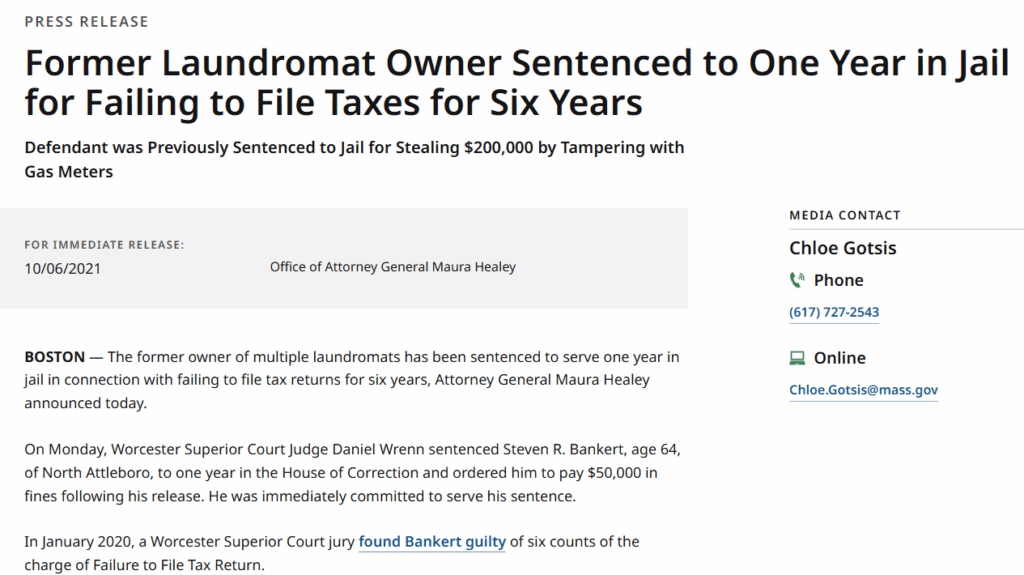Do you know what happens when you don’t file your taxes? The Steven Bankert case will give you an idea.
Attorney General Maura Healey made the announcement recently that the former proprietor of many laundrettes has been given a sentence of one year in prison for failing to file tax returns for a period of six years.
Judge Daniel Wrenn of the Worcester Superior Court handed down a sentence of one year in the House of Correction to Steven R. Bankert, who is 64 years old and hails from North Attleboro. Additionally, he ordered that he pay fines of fifty thousand dollars when he was released from prison. Instantaneously, he was committed to serve the whole of his sentence.

Bankert was found guilty of six counts of the charge of failing to file a tax return by a jury consisting of members of the Worcester Superior Court in January of 2020.
Attorney General Healey stated that the defendant had defrauded the state as well as all of our taxpayers by failing to file their taxes for a number of years. We would like to express our appreciation to the Department of Revenue for their assistance in ensuring that this defendant is held accountable for his criminal actions.
“The punishment handed down by the Worcester Superior Court sends a strong message to those individuals who violate the tax regulations of Massachusetts and fail to file their taxes in a timely manner. Geoffrey E. Snyder, the Commissioner of the Department of Revenue, stated that they will be held accountable for their illegal behavior. “The Department of Revenue is proud of the efforts that the Attorney General’s Office has made to support the pursuit of non-filers and remains committed to the pursuit of those who have not filed their taxes.”

After receiving a complaint from Columbia Gas, the Attorney General’s Office initiated an investigation into Bankert throughout the month of August in 2011. Bankert was previously found guilty in 2017 and sentenced to one year in jail and four years of probation on charges related to the theft of more than $200,000 worth of natural gas. Her sentence was imposed in conjunction with the accusations.
According to the findings of the enquiry conducted by the Attorney General, Bankert, who had previously held a licence to practice as an electrician, stole natural gas by tampering with ten gas metres at six laundrettes that he owned in the cities of Attleboro, Brockton, Lawrence, and Worcester between the years of 2008 and 2012.
During the course of that enquiry, the Attorney General’s Office discovered that the defendant had failed to submit a tax return for the state of Massachusetts for the years 2006 through 2011. This was despite the fact that his laundrettes had collectively generated hundreds of thousands of dollars in revenue during each of those years.
The case was prosecuted by Assistant Attorney General Gabriel Thornton, with assistance from Financial Investigator Jillian Petruzziello and Senior Victim Witness Advocate Megan Murphy, both of whom are members of AG Healey’s Criminal Bureau. Additionally, investigators from the Criminal Investigations Bureau of the Massachusetts Department of Revenue were also involved in the investigation.
What to Keep in Mind While Filing Taxes – How to Avoid Steven Bankert’s Mistake
Filing taxes isn’t just an annual chore — it’s a financial checkpoint that can have real consequences for your wallet, your legal standing, and your peace of mind. Whether you’re a first-time filer or a seasoned taxpayer, a few key reminders can make the difference between a smooth experience and a stressful audit.
Here’s what every U.S. taxpayer should keep in mind during tax season — and why it all matters.
1. Deadlines Matter — Don’t Miss Them
Why it’s important: The IRS isn’t flexible about deadlines. Missing the April filing deadline without an extension can lead to penalties and interest on unpaid taxes. If you’re owed a refund, there’s no penalty for filing late — but you won’t see your money until you do.
Pro Tip: Even if you can’t pay your full tax bill on time, file anyway. The failure-to-file penalty is more severe than the failure-to-pay penalty.
2. Choose the Right Filing Status
Why it’s important: Your filing status affects your standard deduction, tax brackets, and eligibility for credits. Choosing incorrectly — such as filing as “single” instead of “head of household” — can cost you hundreds or even thousands of dollars.
Common statuses:
- Single
- Married filing jointly
- Married filing separately
- Head of household
- Qualifying widow(er)
3. Gather All Income Documents
Why it’s important: Forgetting a W-2 or 1099 can trigger an IRS notice or audit. The IRS receives copies of these forms too — if your return doesn’t match their records, it’s a red flag.
Make sure to collect:
- W-2s (employment income)
- 1099s (freelance, investment, unemployment)
- Interest/dividend statements
- Cryptocurrency transaction reports
- Any state unemployment or stimulus-related documents

4. Don’t Overlook Deductions and Credits
Why it’s important: Credits directly reduce your tax bill; deductions reduce your taxable income. Missing out on these means you’re likely paying more than you should.
Examples of valuable tax breaks:
- Child Tax Credit
- Earned Income Tax Credit (EITC)
- Student loan interest deduction
- Retirement savings contributions credit
- Medical expenses (if itemizing)
5. Watch for Tax Law Changes
Why it’s important: Tax laws can change from year to year — especially after major legislation like the Tax Cuts and Jobs Act or pandemic relief bills. What was deductible last year might not be this year.
Stay informed about:
- Standard deduction updates
- Credit expansions or expirations
- New rules on gig economy income or digital assets
6. File Electronically and Use Direct Deposit
Why it’s important: E-filing is faster, more secure, and reduces errors. Pairing it with direct deposit means you’ll get your refund weeks sooner than mailing a paper return.
Bonus: E-filing with IRS Free File or certified tax software can also flag errors before you submit.
7. Keep Good Records
Why it’s important: You might need proof if the IRS audits your return. Keep copies of all tax documents, receipts for deductions, and confirmation of your filing.
Recommended retention: 3 years minimum, 7 years if you claimed a loss or made a major error.
8. Don’t Ignore IRS Mail
Why it’s important: The IRS doesn’t call, text, or email first — they send letters. Ignoring a notice won’t make it go away. If you disagree with a notice, respond promptly and keep a copy of your correspondence.
9. Plan for the Next Year
Why it’s important: Tax filing is reactive, but tax planning is proactive. Adjusting your withholdings, making estimated payments, or contributing to retirement accounts can lower next year’s tax bill.
Final Thoughts on The Steven Bankert Case
Filing taxes isn’t just about compliance — it’s about protecting your financial future. A small mistake can lead to delays, penalties, or missed opportunities, while careful planning and attention can mean a bigger refund or a lower bill. Stay organized, stay informed, and don’t wait until the last minute.
Taxes might not be fun, but with the right mindset and tools, they don’t have to be painful.